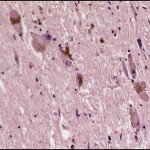Study discovers five new genes linked to Parkinson’s
Five more genes have been linked to Parkinson's disease by researchers at the Institute of Neurology at University College London.
The scientists analyzed 8 million genetic mutations before they identified five new genes connected to the degenerative condition, aside from six genes earlier identified.
The identification of more genes give credence to the theory that Parkinson's has a genetic basis and trigger as opposed to environmental factors such as concussions or chemical exposure.
"The major common genetic variants for Parkinson's have been found," said researcher Nick Wood, who is a professor at the Institute of Neurology at the British university. "We haven't put together all the pieces of the puzzle yet, but we're not that far off."
Genetic samples of 12,000 Parkinson's sufferers and 21,000 others from the U.S. and Europe were studied. The findings showed that those who had mutations in the genes linked to Parkinson's were 2.5 times more likely to develop Parkinson's.
The Parkinson's study was published Wednesday in the online edition of The Lancet. It was co-funded by the National Institute of Aging, the Defense Department and the Wellcome Trust.
An attached commentary by scientists said identifying genes will help experts understand fully how Parkinson's develops and may pave the way for future treatments.
"There is good reason for optimism that these advances will be translated into direct benefits for our patients," wrote Andreas Ziegler and Christine Klein of the University of Lubeck in Germany.
Parkinson's disease develops when amounts of the brain chemical dopamine decline. Patients will have tremors and rigidity among other symptoms. Medical researchers have yet to find a cure for the disease.
